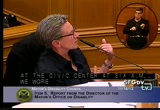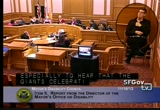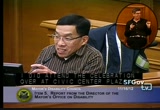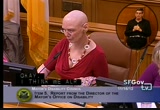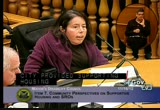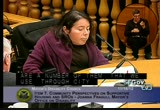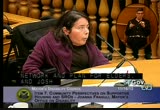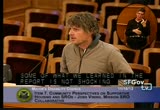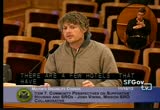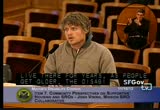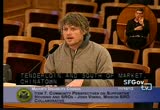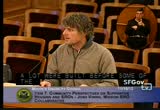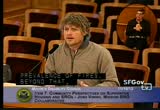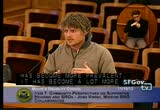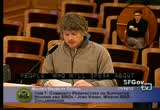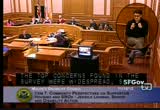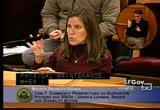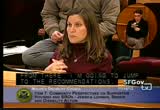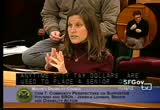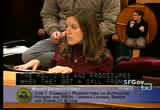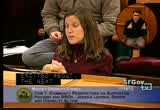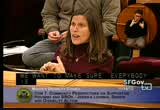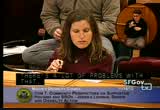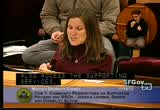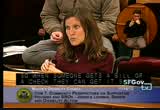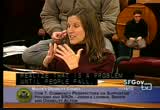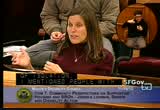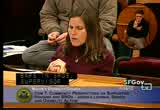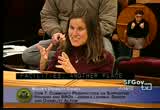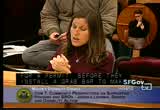tv [untitled] December 5, 2012 3:00am-3:30am PST
3:00 am
brooms with international symbol of access. we escort people from the entrance into the accessible seating area and wherever you could see the sign language interpreters and captioners. because the access ambassadors have the full authority to help people we were able to solve problems as they came up. as an example, the wheelchair lift to the viewing platform broke down when someone was in the lift. joanna -- was one of the access ambassadors. she knew who to talk to and resolve the problem quickly. we were part of the city family's overall effort.
3:01 am
that concludes my directors reports. julian parsons, this is my last directors report to you, it is an honor to be here with you for that. >> great. especially to hear that the giants celebration was so much more accessible than that of 2010. we discussed this in detail in committee. congratulations to those who made that happen for everybody. >> there's actually two things i forgot if i could add. we were proud to offer an mod wheelchair to willy mays here at city hall. for the event. and also, -- are councilmember
3:02 am
roland -- was in the sitting area. i wanted to give an opportunity to see they had comments about that experience as well. >> yes. i did attend the celebration over at civic center plaza. also attended the 2010. by comparison, this year was remarkable. even the new access, getting the ambassadors, people to help, to get to the viewing platform was great. i also witnessed a person who actually needed emergency services. the did use that pathway that
3:03 am
was created. it worked perfectly. i commend the city who put this together. it was remarkable. thank you. >> great. wonderful news. any other comments? colleagues? okay. i think we already, it's time to move on to our next agenda item. community perspective. on supportive housing and sros. we have three presentations. the first of which will be by deputy director fraguli, with the mayor's office on disability. >> it is my great pleasure to do the third and final installment of our housing
3:04 am
series. as you may remember, in the past two months we have been attacking the problem of supporting housing. we heard from the human services agency. in most of those programs, the city provided supporting housing programs, primarily people with disabilities and seniors. one of the major housing areas were single room occupancy hotels or sros. sros for those of you who don't know, are primarily single room dwellings, most commonly without a kitchen and with a shared bathroom. in most cases they are renovated, older style hotels. there are over 500 sro
3:05 am
buildings in the city. housing approximately 30,000 individuals. those are the extremely low income, primarily people with disabilities, seniors, and although most of the sros are private and not under the jurisdiction of the city there are a number of them that we use through city contracts to provide our services. apparently, there are a lot of groups in the city that have been looking at this issue, trying to organize be tenants and provide greater access to people with disabilities and seniors. there was a report that came out this year that shed light to the challenges faced by
3:06 am
seniors and people with disabilities. therefore, this is the community response, communities perspective to the affordable housing issue. i'm happy to have with us today jessica leyman (sounds like) from the senior disability action, former senior action network and plan for elders. and josh -- from the mission sro collaborative. will hear about the report on sros, and finally we'll here about exciting news. i would like to invite both of you guys to come out and help us out. thank you so much for being here.
3:07 am
>> good afternoon. my name is josh vining, community organizer with the mission sro collaborative. i want to give a big thank you to the mdc for inviting us here today and sharing the work that we have been working on for quite a while. it's exciting. some of what we learned in the report is not shocking or no new news. but we do have a report based on a survey of over 150 sro tenant citywide who are either seniors or people with disabilities. who want to share a little bit about the results of the survey and the recommendations that came out as well. as far as sros go, i want to do an overview about what they are.
3:08 am
we learned little bit from joanna earlier. typically, an sro is an 8x10 size room with a sink. some are smaller; some larger. by and large they don't have any cooking facilities in the building. some do have them on one per floor, shared kitche. there are a few hotels that have individual bathrooms. the majority of them are shared on the floor down the hall. we have always i've been at the mission sro for over 5 years, always large percent are seniors. we began the conversation about two years ago and the conversation was about the changing needs of people. a lot of people here in san
3:09 am
francisco -a lot of low-income tenants - get locked into their home. that can be a good thing, it can be a bad thing at the same time. a lot of people when they move in, to choose a home a place that meets their needs, as they live there for years, as people get older, the disabilities change, obviously they become more difficult for people to live in these buildings. the way that the market is here in san francisco with rents going up and up, and rent control design here for folks who have been in their homes for years, is not a whole lot of options other than to stay in the same place and try to make modifications, and make that home work for their needs.
3:10 am
a background on sros: three of them serve single adults, in the mission district. the central city sro collaborative represent people living in tenderloin and south of market. chinatown covers that part and part of north beach. also families united, a citywide collaborative that works with families with children below the age of 18 of which there are about 1000 families year in san francisco that live in these buildings. the way that the sro collaborative first started back in the 1990s, there was a rash of serious building fires.
3:11 am
it affected sro buildings in the communities around. back as we heard earlier, a lot of these buildings were constructed soon after the 1906 earthquake, old housing stock. a lot of deferred maintenance. a lot were built before some of the more stringent housing codes were adopted. there are a lot of challenges to these buildings that exist. they are older; they were built at a time when they were small, even the hallways are small. back to the fire. sro collaborative were established as a response to these fires. focus on organizing the
3:12 am
tenants and trying to come up with solutions to keep fires like this from happening. one of the main things that happened that people may be familiar with is the sprinkler ordinance. in san francisco a hotel room with more than 20 rooms is required have a comprehensive spritzer system in the rooms and throughout the building, and dramatically decreased the prevalence of fires. beyond that, sro collaboratives have worked on the uniform visitor policy; prior to that a lot of landlords and madison were limiting or denying the right to have overnight visitors as well as data on visitors. the uniform visitor policy is a compromise. they don't have the same amount of rights. they can have people overnight every night of the month but it is a compromise, it is a step
3:13 am
in the right direction so that people can have visitors. previously, more recently we have worked closely with the department of public health in reforming some of the ways that that department and the city at large respond to complaints about bed bugs; it has become more prevalent. it has become a lot more of the issue as the media gives more attention to this. the city has adopted protocols to respond to this in a more timely manner. to get back to the report, the mission sro collaborative, senior action collaborative, we went out and we interviewed over 150 sro tenants who live
3:14 am
in chinatown, mission, central city area, seniors, people with disabilities. we had a wide range of questions. it is focused on being a needs assessment. to see what sort of needs the population was facing so we could identify recommendations slowly work to implement those recommendations. we have a couple of other people who will speak about those things today. i will turn it over to jessica at this point to talk a little bit more about what the results of the report were and some of the recommendations that came out of that report. >> thank you. thanks so much to the council for having us here and thank you to joanna fraguli for coordinating this. it is exciting work. it is wonderful to get into it and we see a lot of potential
3:15 am
for making positive changes. i will pick up where josh left us, talk about the survey and the results, and go through the series of recommendations leading to one civic recommendation that is now in legislation. the top concerns found in the survey were widespread, sadly. there were all kinds of problems.. people talk about a lot of different things. top concerns included personal safety, on a lot of levels. visitors were getting into the building when they shouldn't be, having interpersonal problems with other tenants, all kinds of other safety harassment issues. these are not in order. bedbugs and other infestations including roaches, rats, mice, an ongoing problem.
3:16 am
bedbugs are being dealt with separately; a problem for from being solved. a problem we hear from sro tenants all the time. noise is another problem. cleanliness. physical maintenance. when i started doing housing work in san francisco a few months ago, somebody took me on a tour. i saw things lose, exposed wires, egregious maintenance problems. one specific the disability is a lack of maintenance to the elevators. in buildings with elevators, not all of them, they break down all the time. they don't get fixed regularly. some of them are old and are
3:17 am
difficult to fix. housing conditions. health and safety conditions. violations of the visitor policy. harassment. from there i'm going to jump to the recommendations. i will explain what was found in the survey. that is where the recommendations came from. those of us at senior and disability action and the sro collaborative, if safety the major issue, what are some of the things that can be done in the short term and long term? looking at the problems coming up with a series of recommendations. enforcement. a lot of this is about the contract. a lot of sro rooms are
3:18 am
subsidized the city tax dollars. i know you heard over the last couple of months from the department of public health, healthy human agencies, and nonprofits that work with those that place people in sros. we want to look at the contracts. anytime city tax dollars are used to place a senior or a person with a disability into an sro room, that there are safeguards. the property manager, landlord of that building is required to say that yes, in return for getting tax dollars, i will make sure that there are no bedbugs and things are maintained properly. that things are safe. all the basics that we all expect. we are thinking of getting them into the contract is one way to do that. that is something we are working on.
3:19 am
we welcome other ideas and assistance on that. having bph and sha in the last couple of months is a good opportunity to connect with them. and the thing about how we can do that in the contract. we are also looking at the enforcement structure, department of building inspection and the department of health. the policies and procedures when they get a call from tenant, or landlord saying there are roaches, for the elevator is broken and is not being prepared. the policy about coming out and what do they do to make sure the problem gets fixed. we are starting the process of working with those departments to make sure that the process is as efficient and responsive and timely as possible so that those things get fixed right away and making sure that seniors and people with disabilities are safe. and of those problems can come back right away.
3:20 am
the fixes should be real and permanent. that was one of the recommendations. looking at the executive summary which is but has, a chart with recommendations that you can refer to as well. we had a bunch of new policies. i will come back to the first graph, legislation we are excited about. the next couple, having desk clerks at each sro. some already have them, 24-hrs., that let people in. we put this in the recommendations for safety, having someone they are who is monitoring and enforcing the uniform deserve policy to make sure people are allowed when they should be. and to let workers in. but to make sure that there are no other people to come in to
3:21 am
sell drugs for example. we ran into complications about whether that is feasible. along with desk clerks, to put training curriculum for all sro staff. we want to make sure everybody is trained; someone knows about communication, and problem-solving so that when the issues come up the staff is well trained to address them. another recommendation was physical accessibility the maintenance of elevators or placing residents on the lower floors. someone with a disability or senior moves into an sro, they are not required to live on the ground floor but that is an option to make sure people are
3:22 am
safe. oh sure, there is a room on the fourth floor but there is no elevator were people goes out and people are trapped. access to nutritious food. josh talked about how most rooms - no rooms have kitchens. some sros have a kitchen somewhere in the building or on the floor. there's a lot of problems with that. listen less than half of sro residents have access to kitchens. with 18% of respondents, 1 in 5 people say that they skip meals due to lack of resources or facilities.
3:23 am
accommodation problems. they don't have money to buy food and no place to prepare affordable meals. we would like to see some work there. would also want more targeted outreach to seniors and adults with people with disabilities. there are other sros available that they will know about. also access the supporting services. and increase disaster planning for seniors and adults with disabilities. we had a set of long-term goals, but i won't go into much detail. here is what we think that we need something to make sure that seniors and people with disabilities and sros have what they need but are less clear on how to implement. those include the ability to form a tenant council, not attended by management so that
3:24 am
people can speak freely. affordable housing for seniors and adults with disabilities, proposition c is a step in the direction. on-site staff that includes maintenance and janitorial the people are not waiting and trying to figure out who to talk to. individual locking mailboxes, so when someone gets a bill or a check they can get it safely. wellness check, or "i'm ok" door hangers. someone who want to participate, if a neighbor does not see that this is someone they can check on. there was a lot of information. now i will go into more detail on the legislation that we are proposing. in the recommendations, we suggested having grab bars
3:25 am
in bathrooms. in the server we found that less than half of seniors and people with disabilities that we talked to reported having grab bars. not everyone is coming out and saying we need grab bars. people don't necessarily realize that is a problem until people fall. we know that is a major source of injury. in terms of the financial impact going back to the city to say look at the money we are spending on hospital bills on people who slip and falls when that can be prevented by having grab bars in bathrooms. that is one thing we want to work on, and working phone jack along with affordable telephone service. working phone jacks are required by state law; a
3:26 am
residential hotel, tourist hotel is required to have that. pretend that i did not say that. in sros, every room is required have a working phone jack. people are dealing with a lot of isolation. i mentioned people with disabilities who may be in the room where it is hard to get out. the staircase to be rickety. the elevator may be broken. there's a myriad of problems where people can be stranded in the room. phone jacks are one way that people can connect with the outside world. even if they're not physically stranded, to be able to call a friend, to connect with the neighbors, to set up a doctors appointment, critical for seniors and people with disabilities. for everyone to have a working
3:27 am
phone jack. they are not being enforced. there issues with the department of building enforcement. we have recently introduced into the board of supervisors legislation that requires working phone jacks and grab bars in sros. supervisor marr introduced legislation that about two three weeks ago. they were very excited about this happening moving forward, getting a lot of support an interest. we have a handful of supervisors that have agreed to cosponsor. right now the bill is in the process of being amended in going through some committees with the department of building inspection. most likely around january, maybe february, it will go to the land use committee. what the bill says, in more
3:28 am
detail, we mentioned that state code moves into city code as well. water closets, bathing facilities, another place incredibly important to keep people safe. we recognized early on that it is not easy to say for the grab bar in the bathroom. some sros were built in 1911; you have tiny rooms, a window or door where the grab bar would go. or put it on the side and people don't have space to get
3:29 am
out of the bathroom. the mayor's office on disability has agreed to prepare a technical assistance guide. he are some of the common structures for bathrooms, common designs, and here's what you should do about grab bars. also the department of building inspection. buildings would have to file for a permit before they install a grab bar to make sure it is done properly, going into the wall, making sure the reinforcements are there. the end result is we want people to be safe. i will turn it over to clifford gilmore from the central city sro collaborative who will introduce of the tenant will talk about their experience living in sros.
67 Views
IN COLLECTIONS
SFGTV: San Francisco Government Television Television Archive
Television Archive  Television Archive News Search Service
Television Archive News Search Service 
Uploaded by TV Archive on

 Live Music Archive
Live Music Archive Librivox Free Audio
Librivox Free Audio Metropolitan Museum
Metropolitan Museum Cleveland Museum of Art
Cleveland Museum of Art Internet Arcade
Internet Arcade Console Living Room
Console Living Room Books to Borrow
Books to Borrow Open Library
Open Library TV News
TV News Understanding 9/11
Understanding 9/11